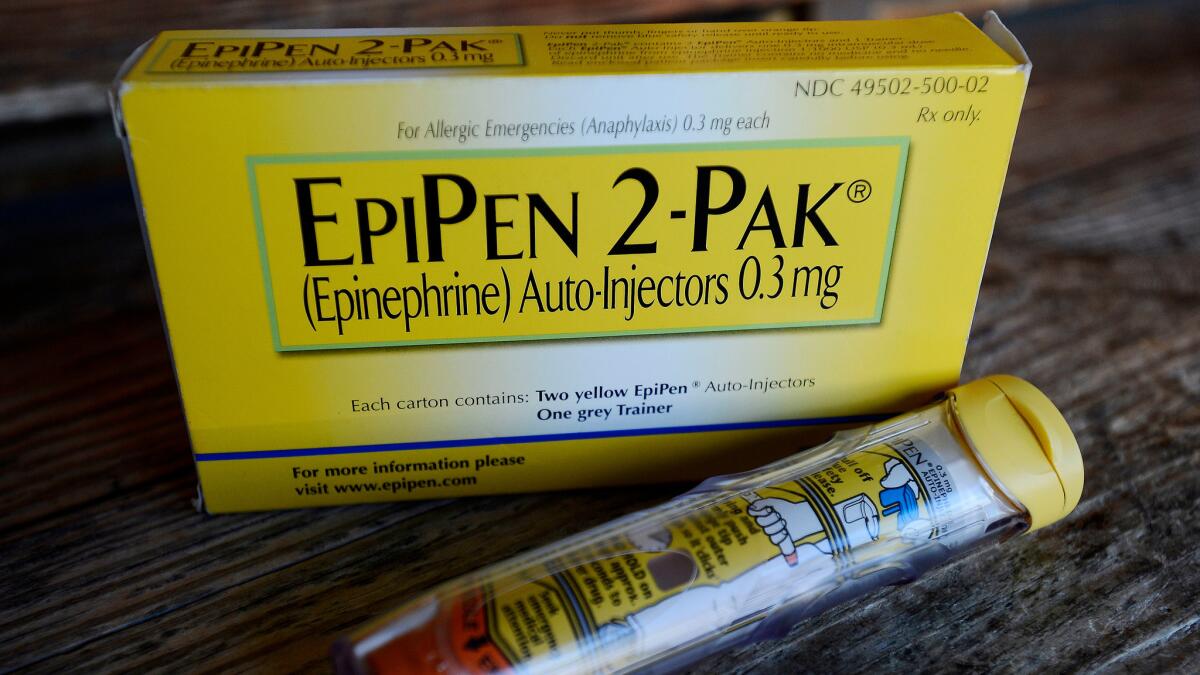Column: Mylan will help more patients pay for its EpiPen. Here’s why that’s bad news for healthcare

- Share via
Mylan, the profiteering, tax-dodging drug company currently taking immense heat for jacking up the price of its Epipen by 500%, announced Thursday that it will help more patients cover their soaring out-of-pocket costs for the allergy drug device.
That’s good for some individual patients and families. But at heart it’s a cynical move that actually protects the company’s profits and harms the healthcare system. As I explained last year, that’s because such moves are often marketing schemes dressed up to look like altruism. Here’s the lowdown.
We ... are taking immediate action to help ensure that everyone who needs an EpiPen Auto-Injector gets one.
— Mylan CEO Heather Bresch
What Mylan is doing is expanding its patient-assistance program by providing eligible patients with a savings card worth up to $300 per prescription and doubling eligibility to households earning up to 400% of the federal poverty level, or $97,200 for a family of four. Many of them therefore would pay nothing out-of-pocket for the device, which delivers a measured dose of epinephrine to stave off anaphylactic shock after eating peanuts, say, or suffering a bee sting.
Such assistance programs are common in the drug industry, which offers them on about 300 high-priced drugs and costs drug makers an estimated $4 billion a year. The drug makers shower themselves in praise for these programs, and Mylan is no different. In the company’s news release announcing the expanded program, Mylan CEO Heather Bresch was quoted thusly: “We have been a long-term, committed partner to the allergy community and are taking immediate action to help ensure that everyone who needs an EpiPen Auto-Injector gets one.”
The truth is, however, that these programs are detested by insurers, healthcare economists and government agencies -- with good reason. In fact, they’re illegal when applied to Medicare or Medicaid patients, because they may violate federal anti-kickback laws, which bar payments made to induce patients to choose particular services. Insurers and goverment programs will have to cover everything beyond the co-pay or deductible, at a price that can be as much as $600 for a two-pack. Before Mylan began raising the price, it was about $100.
These programs are “a triple boon for manufacturers,” David Howard of Emory University observed last year. “They increase demand, allow companies to charge higher prices, and provide public-relations benefits.” The manufacturers’ costs look high in absolute terms, but the payoff is even greater. “Manufacturers can afford to pay a lot of $25 of $50 co-payments in return for even a small increase in sales of a $50,000 drug,” Howard said.
Programs such as Mylan’s actually preserve, not reduce, its pricing power and profits. By covering the out-of-pocket expense for the neediest and most vulnerable patients, the company hopes to quell the public uproar over its price boosts for the EpiPen. That uproar has generated calls for investigations on Capitol Hill and a crash in the company’s stock price, which lost more than 10% in a matter of days as the controversy erupted.
You’ll notice that Mylan isn’t offering to reduce the wholesale or retail price of the EpiPen. Insurers and the government programs will still have to pay its asking price. Its cost to cover co-pays for the relatively small number of customers served by the program will be vastly outweighed by its profits on the device, which racked up $1 billion in sales for the company last year, at a profit margin that may approach 55%.
Mylan’s announcement of its expanded patient-assistance program drips with cynicism. In its news release, Bresch states: “We recognize the significant burden on patients from continued, rising insurance premiums and being forced increasingly to pay the full list price for medicines at the pharmacy counter. Patients deserve increased price transparency and affordable care, particularly as the system shifts significant costs to them.”
By the way, Mylan in its statement takes a swipe at the Affordable Care Act. “As the health insurance environment has evolved, driven by the implementation of the Affordable Care Act, patients and families enrolled in high deductible health insurance plans, who are uninsured, or who pay cash at the pharmacy, have faced higher costs for their medicine.”
This may be the most cynical piece of Mylan’s pitch. The Affordable Care Act has reduced sharply the ranks of the uninsured, which means it has increased Mylan’s customer base.
Mylan is transparently attempting to shift the conversation from its own role in the healthcare crisis— its own price increase — by trying to shift focus to the shortcomings of “the system.” It’s sleight of hand aimed at obscuring the fact that the “significant costs” being shifted to patients are costs imposed by Mylan itself.
If Mylan really wants to “do our part to drive change” in the system, as it claims in its announcement, it can start by cutting back its own list price for the device. It hasn’t mentioned any plans to do that … yet.
Keep up to date with Michael Hiltzik. Follow @hiltzikm on Twitter, see his Facebook page, or email [email protected].
Return to Michael Hiltzik’s blog.
UPDATES:
8:49 a.m., Aug. 26: This post has been updated to clarify the terms of Mylan’s patient assistance program.
More to Read
Inside the business of entertainment
The Wide Shot brings you news, analysis and insights on everything from streaming wars to production — and what it all means for the future.
You may occasionally receive promotional content from the Los Angeles Times.











